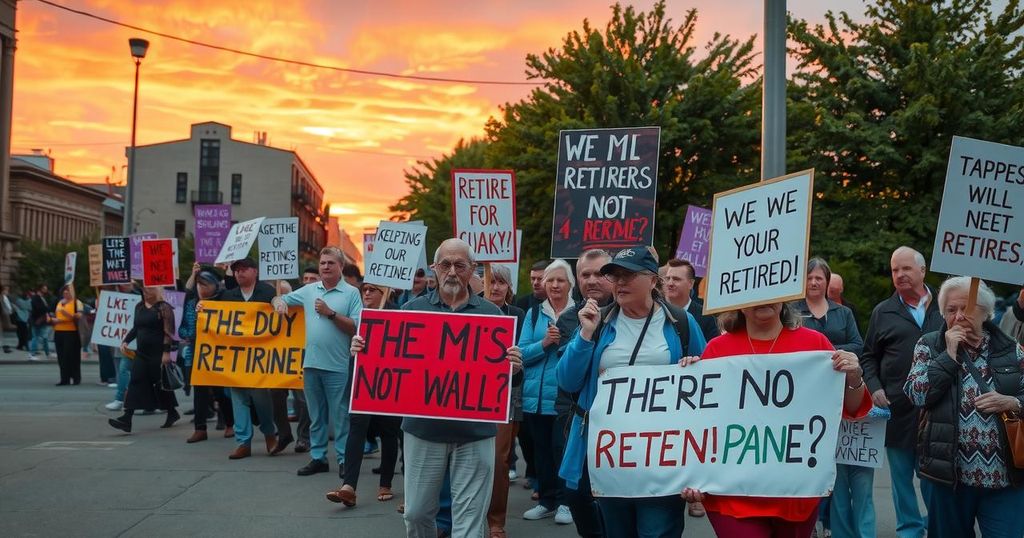State Repression in Buenos Aires: Police Assault on Protesting Retirees

On March 12, police violently suppressed a protest in Buenos Aires involving retirees and workers opposing benefit cuts mandated by President Javier Milei’s administration. This repression, marked by an overwhelming police presence and injuries to demonstrators, has drawn comparisons to past instances of state violence and raised significant concerns about civil liberties and press freedoms in Argentina.
On March 12, a violent incident occurred in Buenos Aires as federal and municipal police forces attacked thousands of demonstrators, including pensioners, workers, and soccer fans, protesting against benefit cuts. This action, ordered by President Javier Milei’s administration, has been described as one of the most severe acts of state repression since the protests of December 2001. Those protests led to the resignation of President Fernando de la Rúa amid a significant financial crisis, affecting millions.
The demonstration was part of ongoing weekly efforts by retirees demanding the restoration of social security pensions, medical benefits, and protection from inflation. The austerity measures imposed by the Milei administration have severely impacted their living standards. This week’s protests also saw participation from Buenos Aires transit workers, reflecting growing solidarity among affected groups.
Evidence suggests that the Milei administration instigated the violence to justify heightened attacks on civil liberties. Security Minister Patricia Bullrich dispatched over 1,000 police officers to the protest site ahead of the scheduled start, instructed to disperse protesters and prevent further arrivals. Consequently, a chaotic confrontation ensued, involving extensive use of rubber bullets and tear gas by the police.
Disturbing footage emerged showing a police provocateur allegedly planting a firearm in the square while others documented abandoned police vehicles, possibly to incite vandalism. The violent repression resulted in 672 injuries and 114 arrests; those detained were released hours later but still face charges.
Among the injured was 87-year-old Beatriz Blanco, who was struck by a police baton, and a 14-year-old girl affected by tear gas. Journalist Pablo Grillo sustained significant head injuries from a tear gas grenade during the confrontation, casting serious concerns over press freedoms under the current administration.
Alejandra Bartoliche, Vice President of the Graphic Reporters Association, emphasized that the targeting of the press has become increasingly frequent since Milei assumed office. Bartoliche highlighted that the firearm used against Grillo was previously banned due to past abuses and called for the protection of press freedoms as outlined by the Constitution.
The actions of Bullrich have reversed critical limitations on police force established after the unfortunate incident involving educator Carlos Fuentealba in 2007, when he was killed by police fire during a protest. This reversal reinstates a “Security Doctrine” reminiscent of tactics employed during Latin America’s Cold War era, allowing for severe measures against dissent.
In response to Grillo’s assault, demonstrations took place in Montevideo, Uruguay, featuring journalists showing solidarity with the retirees. Similar protests occurred in Buenos Aires, where photographers rallied against the police violence and demanded Bullrich’s resignation.
As the government braces for increased protests, including participation from broader labor and political factions, Milei and Bullrich remain committed to a stringent approach to civil unrest. Their statements indicate a refusal to retreat from the aggressive methods displayed during the March 12 confrontation.
In a concerning public address, President Milei referred to protesting retirees disparagingly, asserting that the police protect the community from those he deems a threat. His controversial governance style, marked by corrupt judicial appointments and alliances with powerful interests, raises alarm about the direction of democracy in Argentina and in the context of global capitalism’s crises.
The events surrounding the March 12 protests in Buenos Aires illustrate a troubling escalation in state repression under President Javier Milei’s administration, primarily targeting retirees asserting their rights amid austerity measures. The use of police violence to quell dissent raises serious concerns regarding civil liberties and press freedoms. As demonstrations grow, the government’s refusal to adopt a conciliatory approach may result in further civil unrest and a deteriorating political climate in Argentina. Public sentiment against Milei’s oppressive policies reflects deep-seated frustrations with socioeconomic inequalities exacerbated by government actions.
Original Source: www.wsws.org







